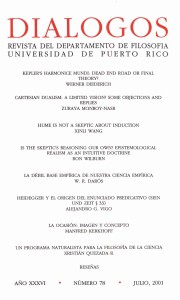Résumé
Is the skeptic's reasoning our own? That is, is the ske ptic's reasoning recognizably ordinary, or is it a product, so to speak, of premises and inferential standards peculiar to distitzctively philosophical preoccupatio ns? The question is an important one on two levels. At a general level, it is important to those who, like myself, regard skepticism as aparadigmatic philosophical issue . For, as such, it raises fundamental concerns regarding the status of philosophical reasoning generally. But even at a more particular level, it raises interesting concerns about the status and domain of epistemology. For, if it could be shown that there is something significantly artificial about the skeptic's global concerns over the possibility of empirica l knowledge, then the more parochial and immanent agendas of naturalistic knowledge theory would seem to acquire validation.

Ce travail est disponible sous licence Creative Commons Attribution - Pas d’Utilisation Commerciale 4.0 International.

